Special Report
Teams with the Worst Record the Year Before Making the Super Bowl
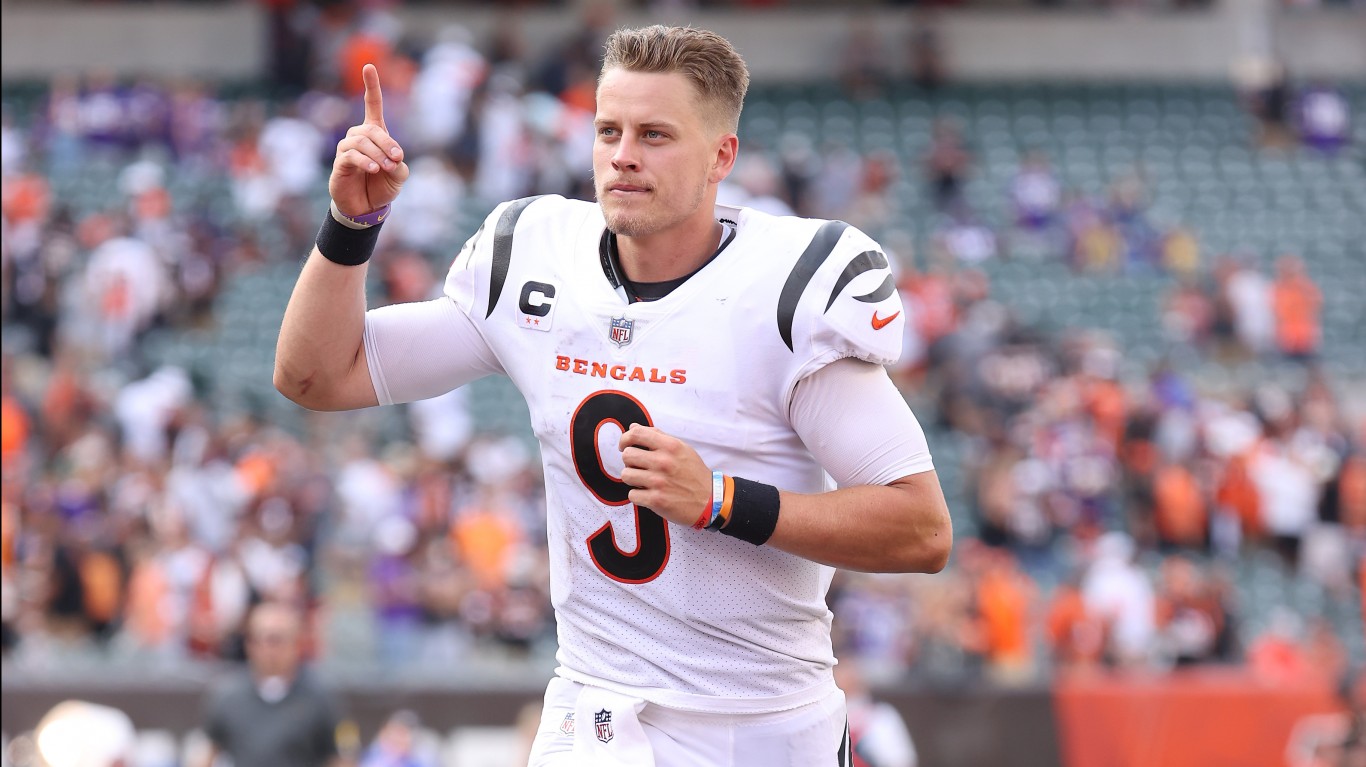
Published:

The Cincinnati Bengals have pulled off an impressive turnaround, going from a lousy 4-11-1 record in 2020 to making the Super Bowl the following season. QB Joe Burrow and receiver Ja’Marr Chase are one of the most explosive offensive duos in the NFL, while defensive ends Trey Hendricks and Sam Hubbard elevated Cincinnati’s defense.
While this type of turnaround is rare, it is not unheard of. In fact, the Bengals are the 24th team in NFL history to have a record of .500 or worse, then make it to the Super Bowl the next season.
To determine the teams with the worst record the year before making the Super Bowl, 24/7 Tempo reviewed the records of all franchises the year before they made the Super Bowl using data from Pro Football Reference.
Many of the teams on this list have several common traits – often, the head coach is in his second or third year. New coaches generally come into losing teams and need a few seasons to fully implement their offensive or defensive system. Other teams benefitted from new players, whether by drafting a young superstar QB like Joe Burrow or adding quality players through free agency.
Many of the teams on this list had never had any kind of success before reaching the Super Bowl yet are now remembered as dynasties. These kinds of turnarounds can happen quickly and should give hope to fans of downtrodden franchises that they, too, can go from laughingstocks to lifting the Lombardi Trophy in just a few seasons. These are the teams that have never won the Super Bowl.
Click here to see the teams with the worst record the year before making the Super Bowl

15. 2016 Atlanta Falcons
> 2015 record: 8-8
> 2016 record: 11-5
> Super Bowl result: Lost Super Bowl LI, 34-28
The 2016 Atlanta Falcons were one of 24 teams to make the Super Bowl after finishing the previous season at .500 or below. After a disappointing 6-10 2014 season, the Falcons hired Dan Quinn to be their head coach. He began his turnaround by helping the team boost its record to 8-8 the next season. The next season, the Falcons were bolstered by a strong 2016 draft class. Their first four picks from that season have all made at least one Pro Bowl or All-Pro team.
QB Matt Ryan had his best season and won MVP in 2016, and receiver Julio Jones and running back DeVonta Freeman both earned Pro Bowl nods. Unfortunately for the Falcons, that season ended in a heartbreaking collapse in the Super Bowl against the New England Patriots. The Falcons made the playoffs again the next season but have not been back since.
[in-text-ad]
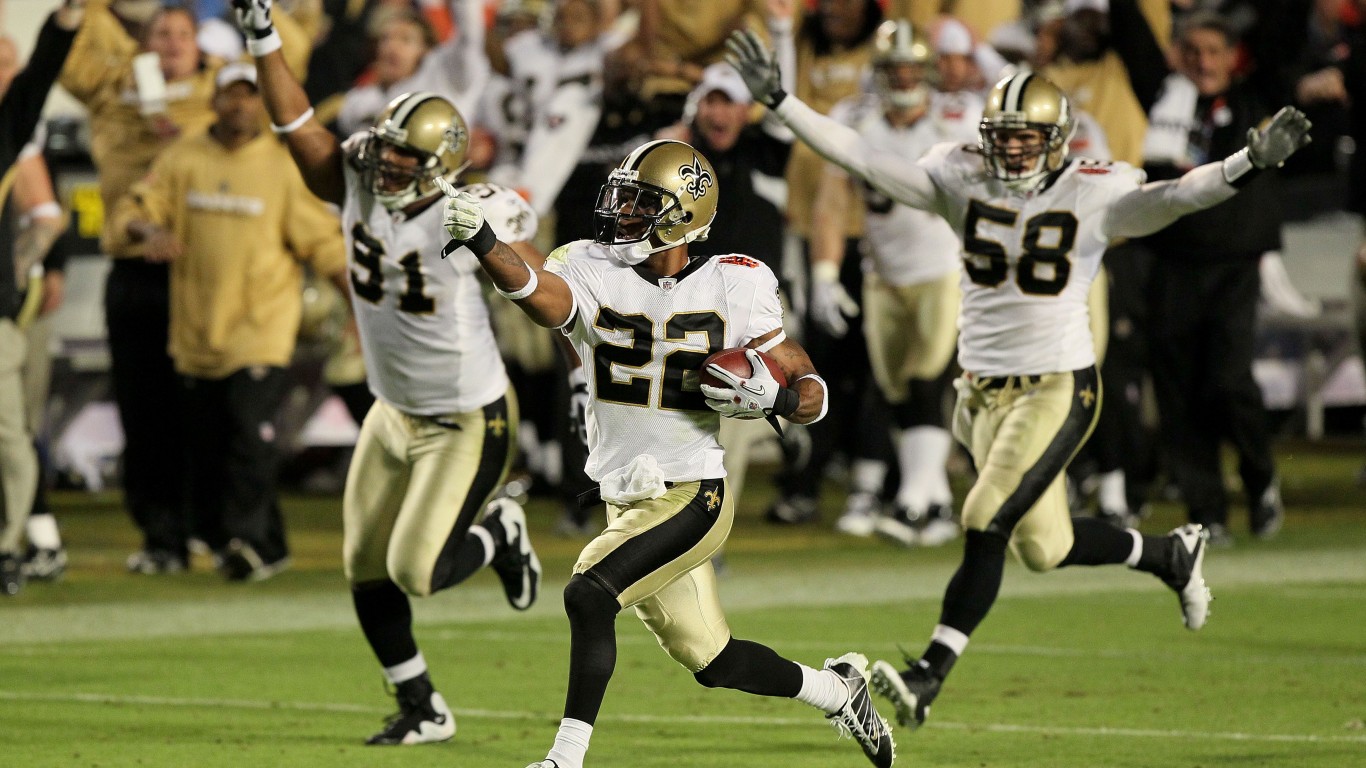
15. 2009 New Orleans Saints
> 2008 record: 8-8
> 2009 record: 13-3
> Super Bowl result: Won Super Bowl XLIV, 31-17
In their first years with head coach Sean Payton and QB Drew Brees, the New Orleans Saints had a terrific offense but a lackluster defense, resulting in mediocrity. The Saints went 7-9 in 2007 and 8-8 in 2008. The team finally became great in 2009, due in large part to defensive coordinator Gregg Williams.
Though New Orleans still gave up a lot of yards, they finished second in the league in takeaways, with 39. This proved to be the difference – the Saints intercepted Minnesota Vikings QB Brett Favre in the final minute of the NFC Championship game to force overtime and pull off the 31-28 win. Then, in the Super Bowl, Tracy Porter returned a Peyton Manning interception 74 yards for a touchdown late in the fourth quarter to seal the Saints first ever Super Bowl title.
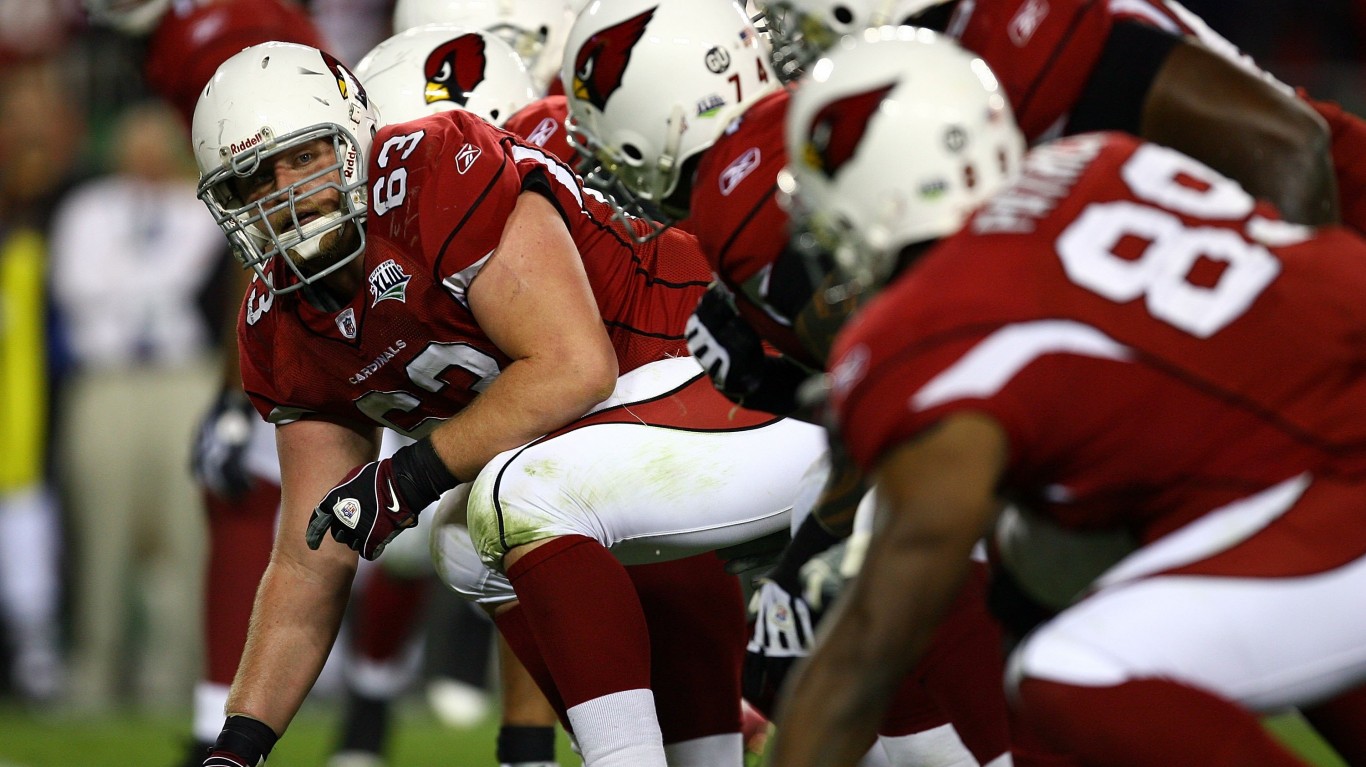
15. 2008 Arizona Cardinals
> 2007 record: 8-8
> 2008 record: 9-7
> Super Bowl result: Lost Super Bowl XLIII, 27-23
The 2008 Arizona Cardinals barely improved on their 8-8 record from the previous season. Still, as the rest of the NFC West teams had a losing record that season, the 9-7 Cardinals made the playoffs.
The 2008 Cardinals were finally able to have continuity at the QB position, with two-time MVP Kurt Warner starting all 16 games for the first time in his four years in Arizona. Receiver Larry Fitzgerald had the best season of his storied career, and the Cardinals had one of the NFL’s top offenses, taking them all the way to the Super Bowl. The Cardinals lost the Super Bowl in a heartbreaker to the PIttsburgh Steelers on a last-second touchdown pass to Santonio Holmes.
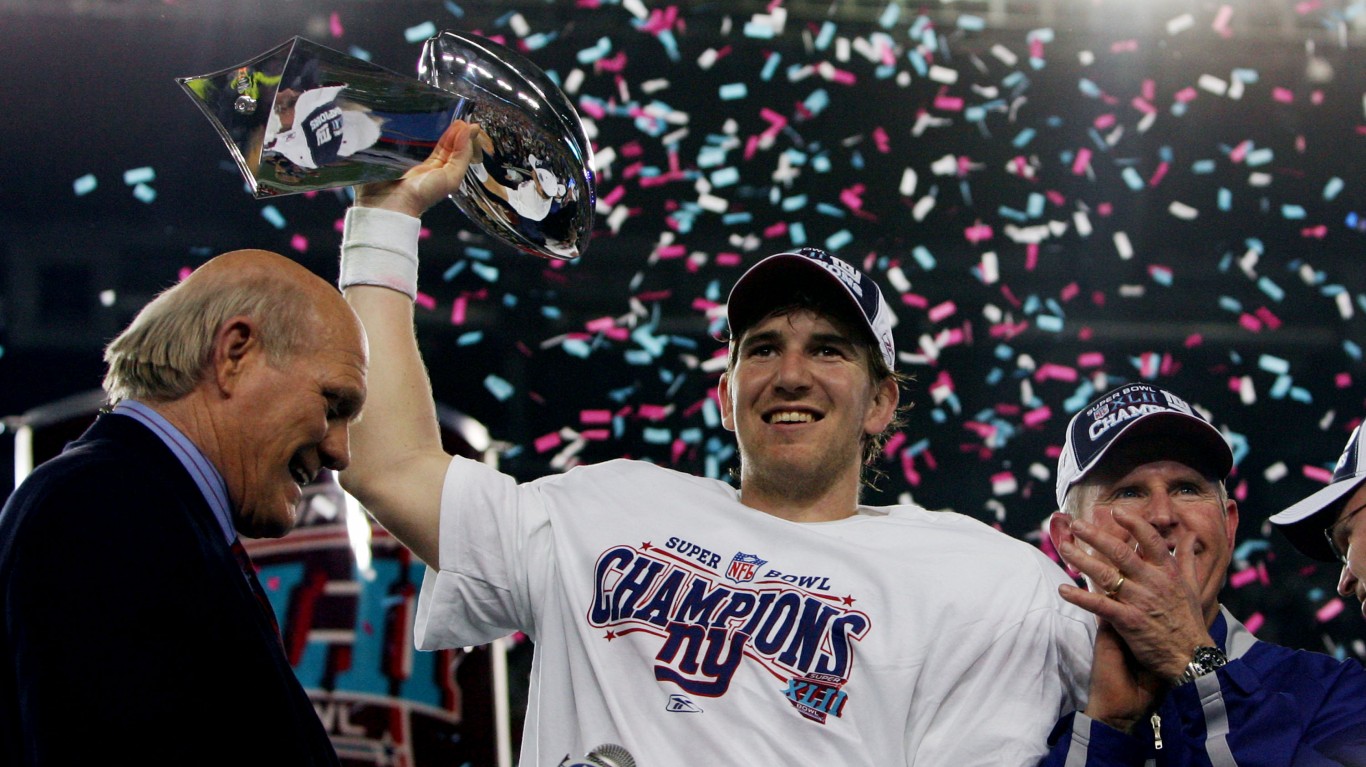
15. 2007 New York Giants
> 2006 record: 8-8
> 2007 record: 10-6
> Super Bowl result: Won Super Bowl XLII, 17-14
Though the New York Giants went from a .500 team to Super Bowl champions in 2007, they had been a good team for several years. Head coach Tom Coughlin took the Giants to the playoffs the two seasons before, barely getting into the 2006 postseason with an 8-8 record.
The Giants defense made massive strides forward from 2006 to 2007, thanks to contributions from young players like Aaron Ross and Osi Umenyiora. New defensive coordinator Steve Spagnuolo got the best out of his players in the postseason, as the Giants gave up less than 17 points per game in the playoffs. In one of the biggest upsets in sports history, this New York team managed to stifle the previously undefeated New England Patriots and win Super Bowl XLII 17-14.
[in-text-ad-2]
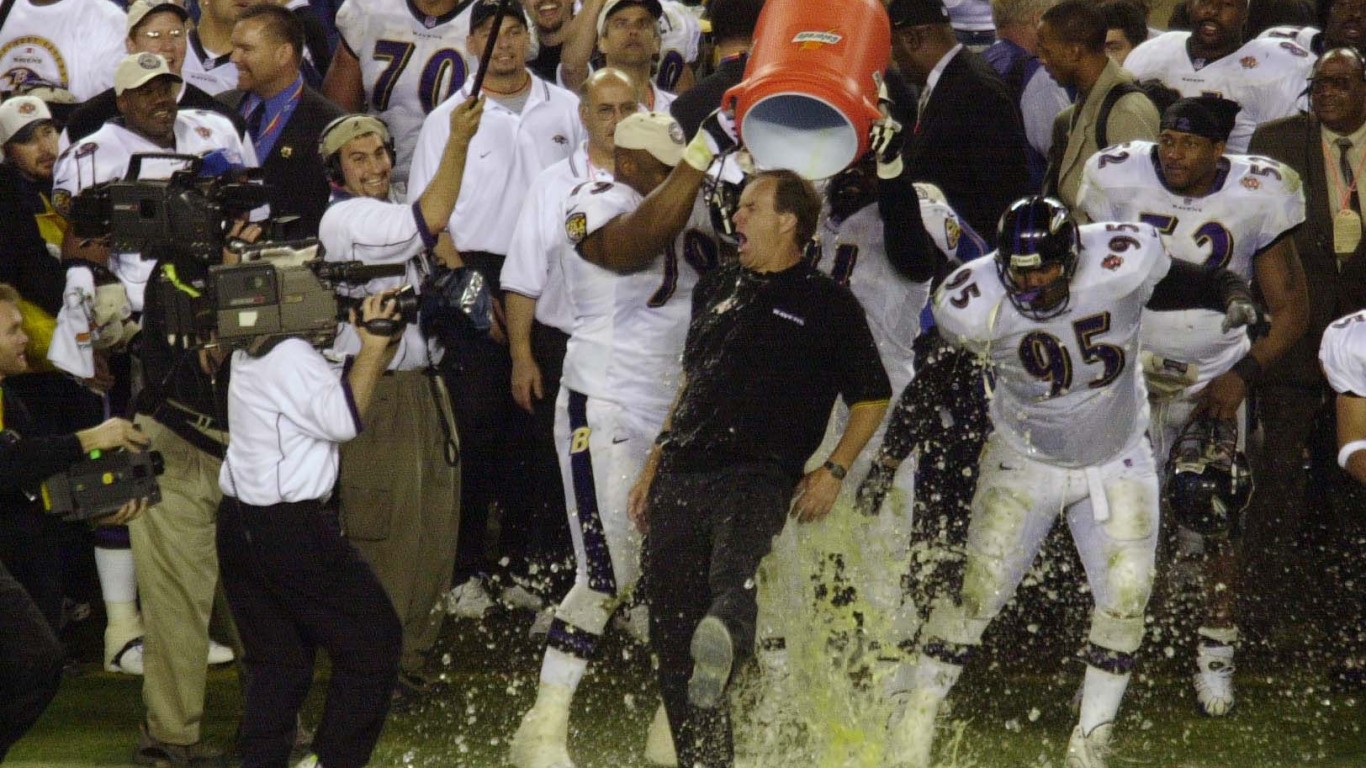
15. 2000 Baltimore Ravens
> 1999 record: 8-8
> 2000 record: 12-4
> Super Bowl result: Won Super Bowl XXXV, 34-7
The 2000 Baltimore Ravens defense will go down as one of the best units in NFL history, allowing just 10.3 points per game, thanks to star players like Ray Lewis and Rod Woodson. The 1999 Ravens defense was good as well, but the team went 8-8 with a sputtering offense.
For the 2000 season, Baltimore added QB Trent Dilfer as a backup, but he took over the starting job midseason and excelled, going 7-1 as a starter. The team also got a great rookie season out of running back Jamal Lewis. The 12-4 Ravens rolled through the playoffs, holding all four opponents to 10 or fewer points and winning each game by double digits, including a 34-7 romp over the New York Giants in the Super Bowl.
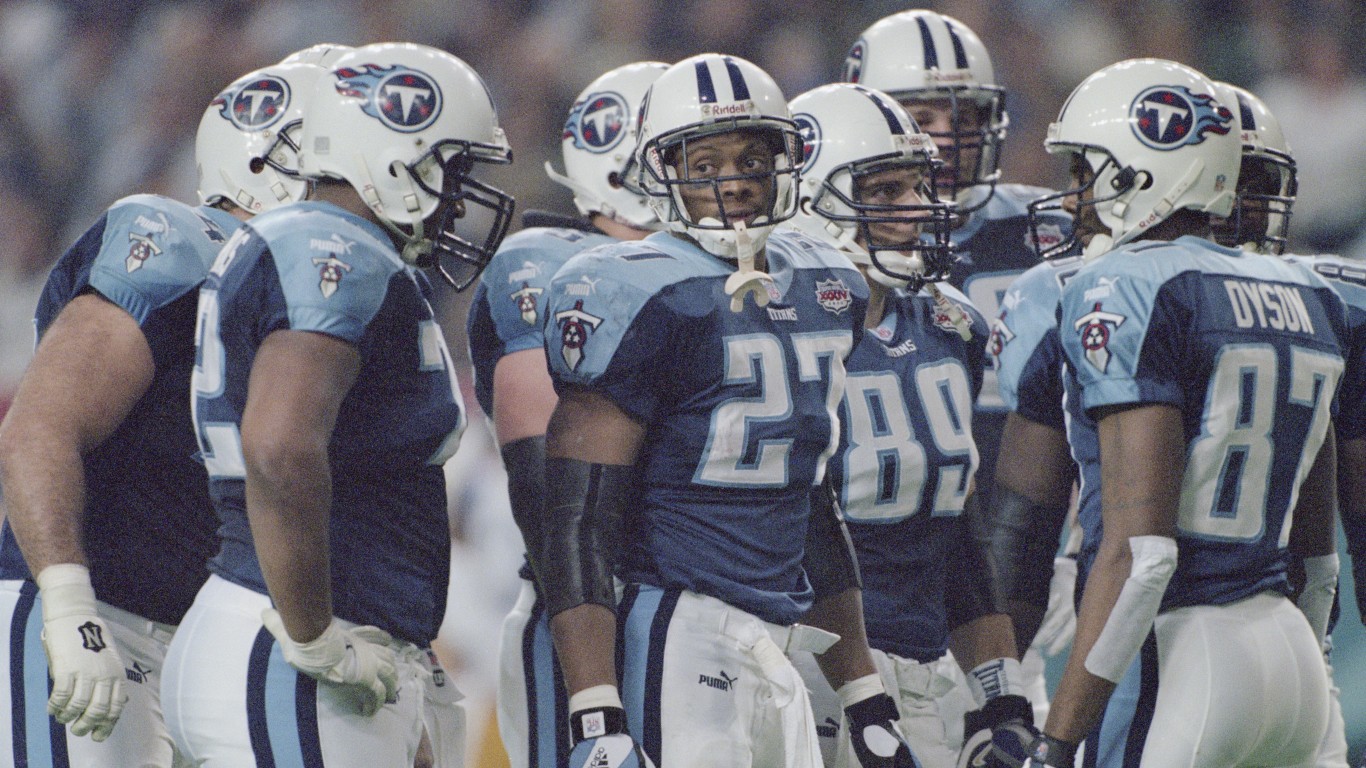
15. 1999 Tennessee Titans
> 1998 record: 8-8
> 1999 record: 13-3
> Super Bowl result: Lost Super Bowl XXXIV, 23-16
The 1999 Tennessee Titans became one of the best teams at forcing turnovers, thanks in large part to rookie Jevon Kearse. He earned Defensive Rookie of the Year honors after recording 14.5 sacks and forcing a league-high eight fumbles. Young defensive backs Samari Rolle and Dainon Sidney also contributed with multi-interception seasons as well.
Tennessee also had a high-powered offense that season, with running back Eddie George and tight end Frank Wychek earning Pro Bowl spots. This combination of a potent offense and ball-hawking defense turned Tennessee from a team that finished 8-8 three seasons in a row into a 13-3 powerhouse that made it to the Super Bowl. The Titans lost a nail-biter in the Super Bowl to the St. Louis Rams.
[in-text-ad]
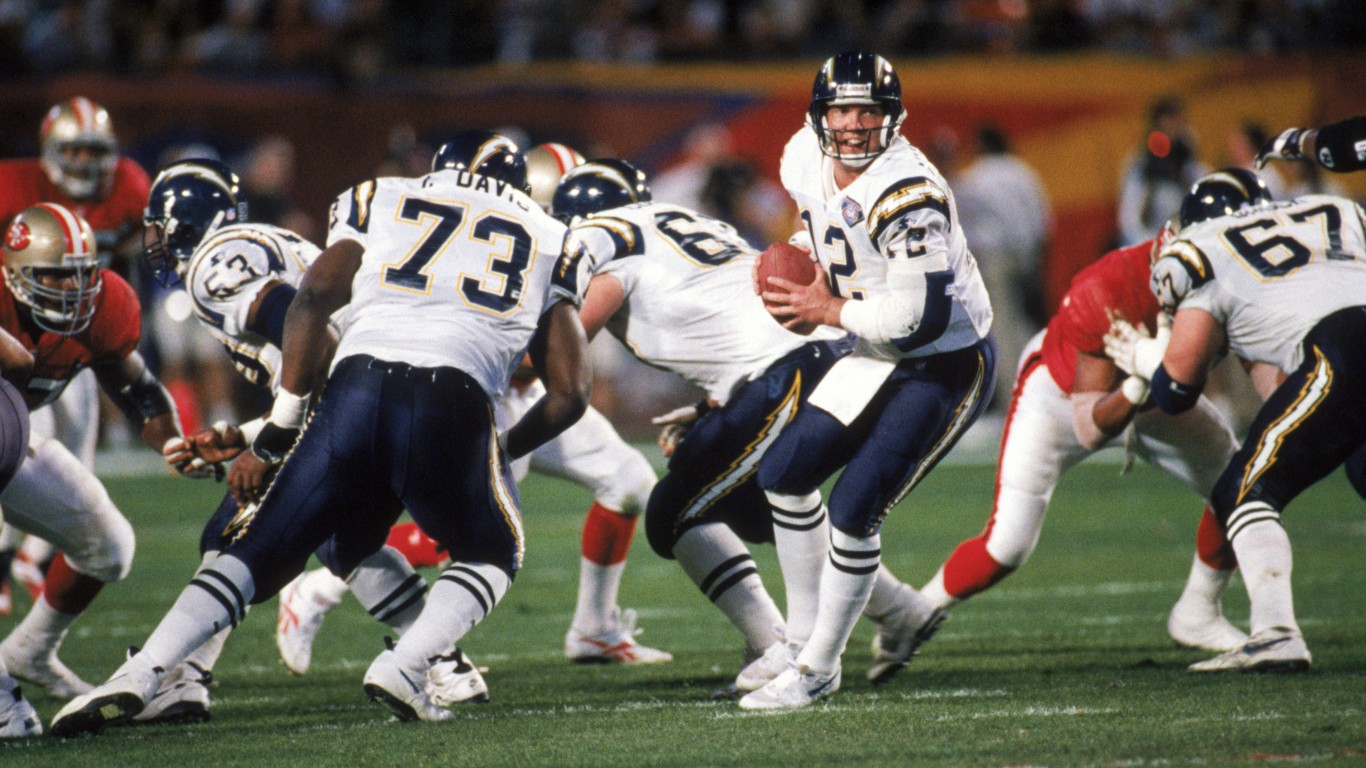
15. 1994 San Diego Chargers
> 1993 record: 8-8
> 1994 record: 11-5
> Super Bowl result: Lost Super Bowl XXIX, 49-26
The 1994 season marked San Diego Chargers head coach Bobby Ross’s second playoff appearance in three seasons. After going 11-5 and making the playoffs in his first season at the helm in 1992, the Chargers dipped to 8-8 the next season after quarterbacks Stan Humphries and John Friesz both suffered through injuries.
In 1994, Humphries was healthy and productive, while defensive ends Chris Mims and Leslie O’Neal both recorded double-digit sacks, helping turn the Chargers’ defense into one of the best in the league. The 11-5 Chargers won their first two playoff games narrowly, before being throttled by the San Francisco 49ers in the Super Bowl 49-26.
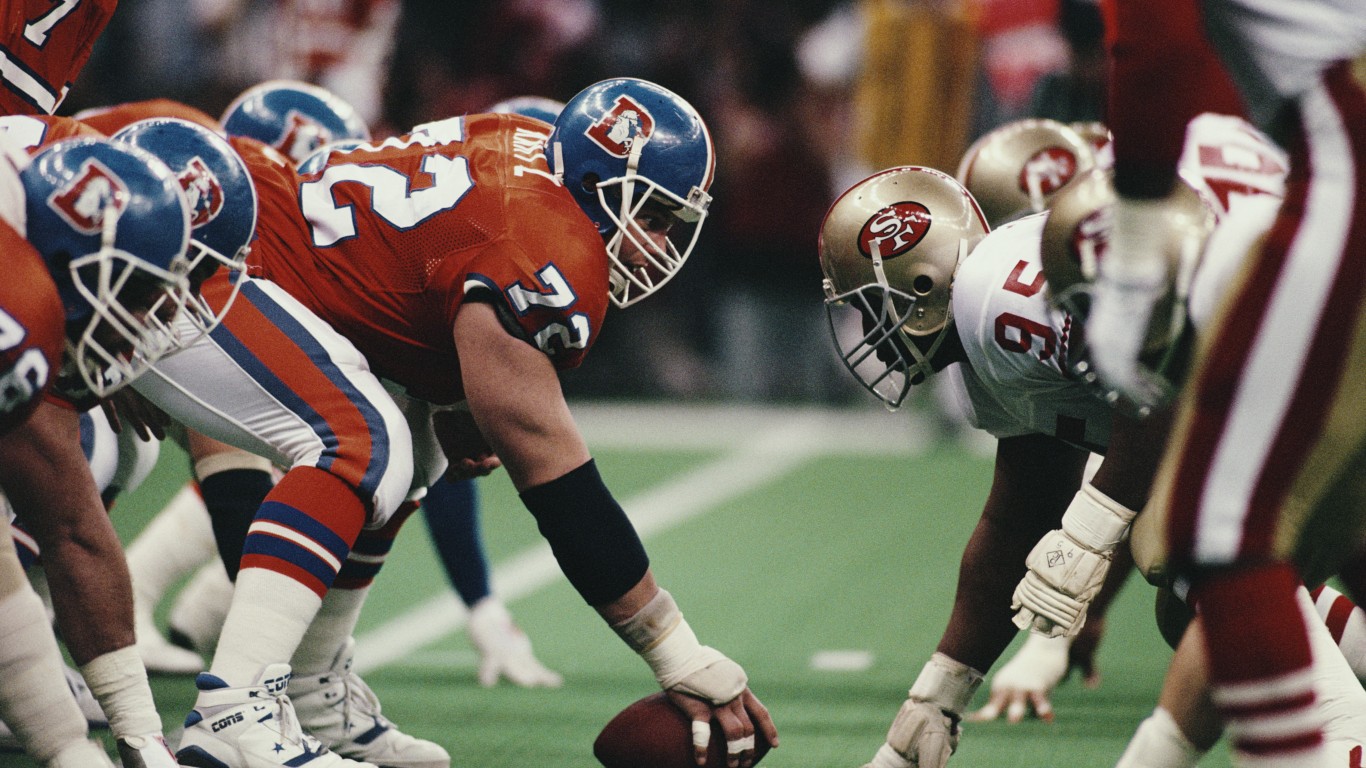
15. 1989 Denver Broncos
> 1988 record: 8-8
> 1989 record: 11-5
> Super Bowl result: Lost Super Bowl XXIV, 55-10
The Denver Broncos may have had an 8-8 record in 1988, but they were hardly a struggling team. With Hall of Fame QB John Elway, the Broncos made it to the Super Bowl after the 1986 and 1987 season, losing both.
The Broncos defense struggled in 1988, ranking among the 10 worst in yards and points given up. The next season, they hired Wade Phillips as defensive coordinator, and the team returned to form and earned their way back to the Super Bowl. Unfortunately for Denver, the Broncos suffered the most lopsided Super Bowl loss of all time, 55-10 to the San Francisco 49ers.
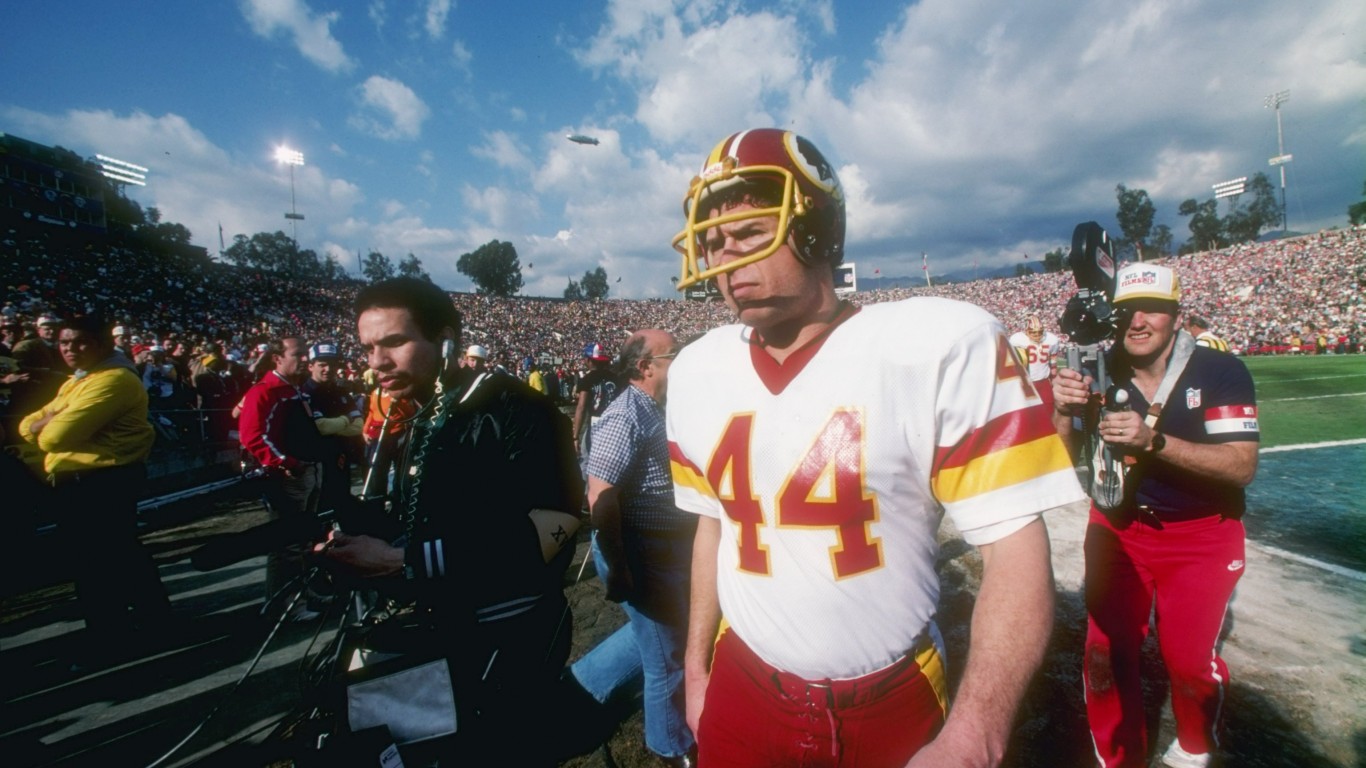
15. 1982 Washington Football Team
> 1981 record: 8-8
> 1982 record: 8-1
> Super Bowl result: Won Super Bowl XVII, 27-17
The Washington Football Team went 8-1 in the strike-shortened 1982 season, en route to a Super Bowl victory. That was the second season with legendary coach Joe Gibbs, part of a very quick turnaround. Washington went from 6-10 the season before Gibbs arrived to 8-8 in his first season in charge in 1981.
Part of the turnaround was improving the play of quarterback Joe Theismann. Though he had been a starting QB for many years, 1982 was his breakout season. Theismann earned his first Pro Bowl nod, with help from rookie wide receiver Charlie Brown, who also made the Pro Bowl. Washington defeated the Miami Dolphins in the Super Bowl – their first of three within a decade.
[in-text-ad-2]
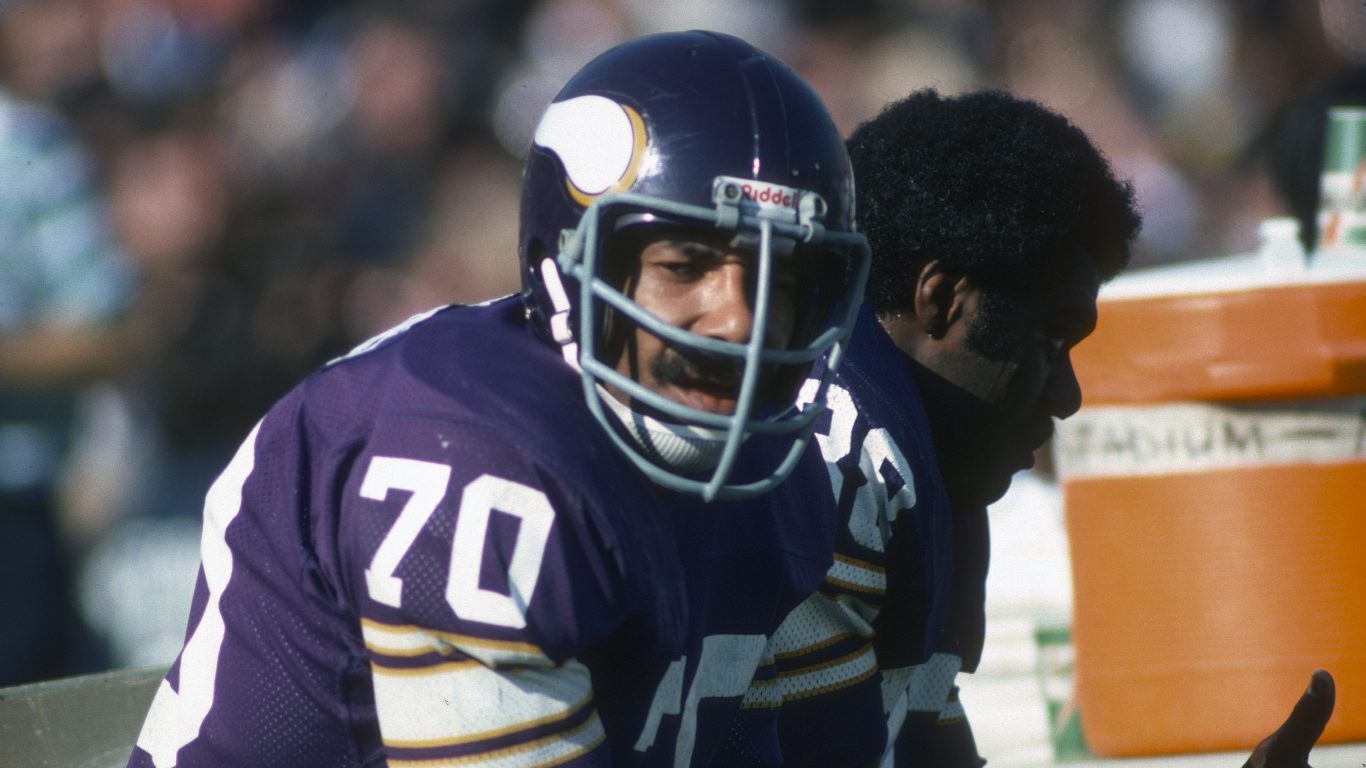
15. 1973 Minnesota Vikings
> 1972 record: 7-7
> 1973 record: 12-2
> Super Bowl result: Lost Super Bowl VIII, 24-7
The 1972 Minnesota Vikings season represented a brief dip in a terrific stretch under head coach Bud Grant. It was the only season from 1968-1978 the team missed the postseason. Hall of Famers like defensive linemen Carl Eller and Alan Page didn’t play up to their usual form, as the defense was less dominant than usual.
The next season, the Vikings returned to their terrific form, winning their division. In his second season in Minnesota, Fran Tarkenton gelled with the team, helping the Vikings make it all the way to the Super Bowl. Minnesota would go on to lose the Super Bowl to the Miami Dolphins 24-7.
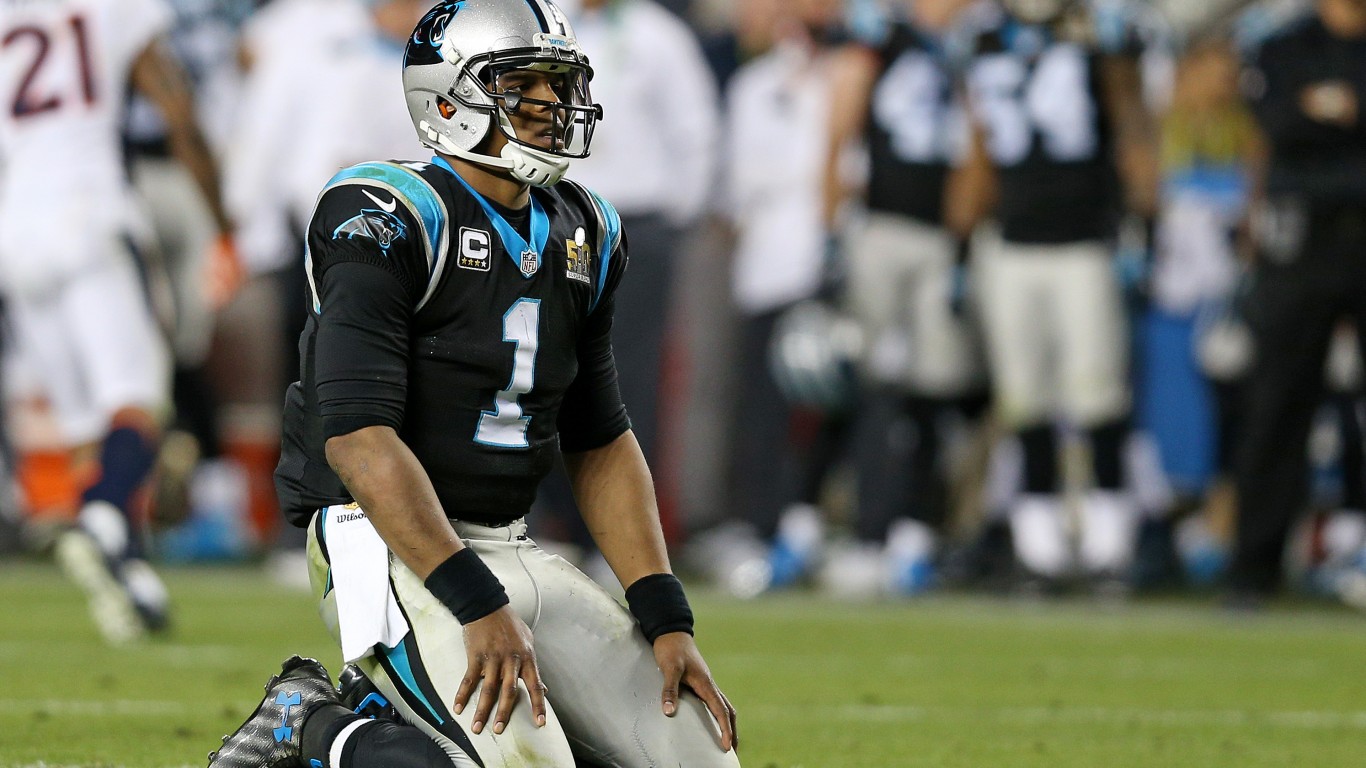
14. 2015 Carolina Panthers
> 2014 record: 7-8-1
> 2015 record: 15-1
> Super Bowl result: Lost Super Bowl 50, 24-10
The 2015 Carolina Panthers were one of just 14 teams to make the Super Bowl a season after having a losing record. The team struggled to a 7-8-1 record in 2014, just one season after going 12-4. Those Panthers still made the playoffs, as the other three NFC South teams were even worse.
In 2015, the Panthers returned to form and got some career-best seasons out of star players. QB Cam Newton won MVP, passing for 35 touchdowns and rushing for 10 more. Corner Josh Norman and linebacker Luke Kuechly were both named All-Pro. The Panthers had a top 10 offense and defense, went 15-1, and made it to the Super Bowl, where they lost to the Denver Broncos.
[in-text-ad]
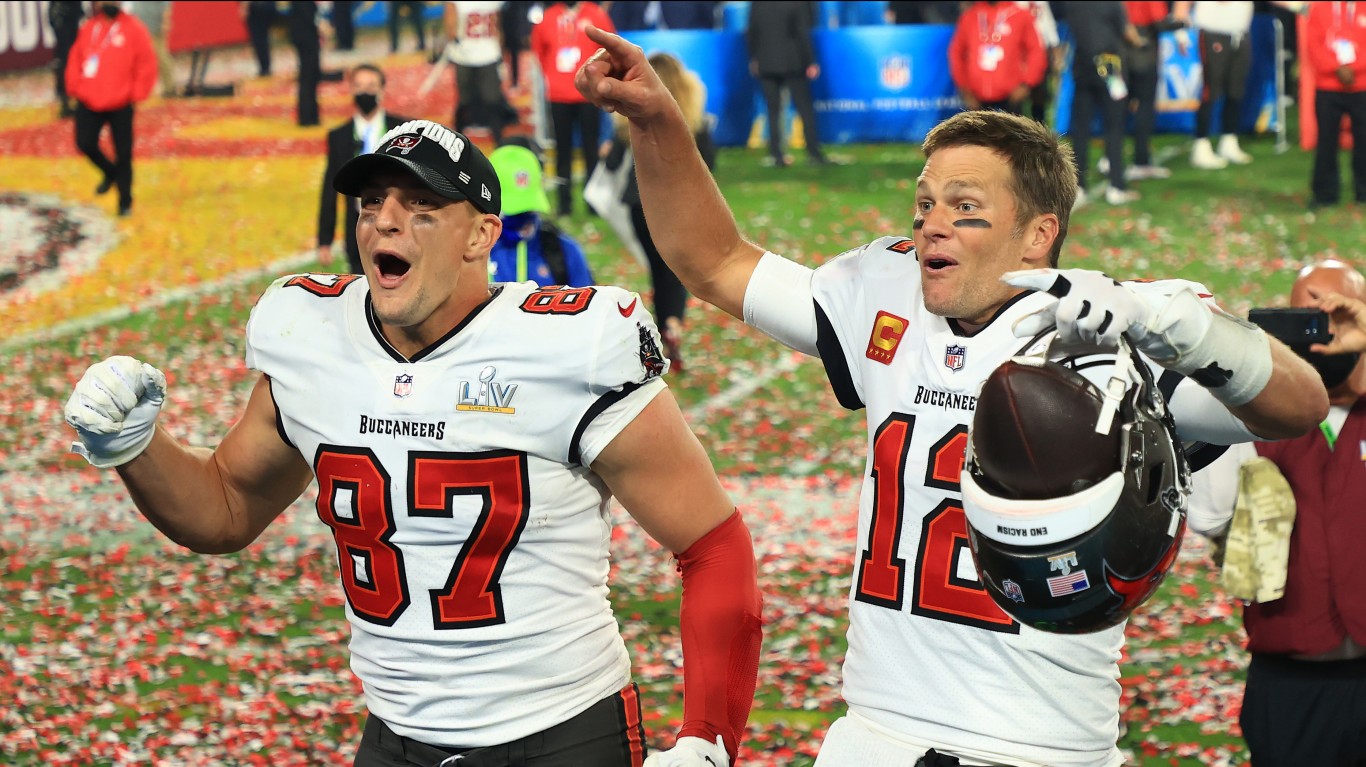
9. 2020 Tampa Bay Buccaneers
> 2019 record: 7-9
> 2020 record: 11-5
> Super Bowl result: Won Super Bowl LV, 31-9
Ahead of the 2020 season, the Tampa Bay Buccaneers had not made the playoffs in over a decade. But that all changed with the arrival of Tom Brady. The NFL’s most accomplished QB ended his time in New England and headed to Florida to help turn the 7-9 Bucs into contenders.
Though Brady deservedly gets a lot of credit for the Bucs’ turnaround, the defense made incredible strides as well. In 2019, the Bucs defense was one of the league’s worst, but young stars like Devin White and Antoine Winfield Jr., along with proven veterans Jason Pierre-Paul and Ndamukong Suh, made Tampa’s defense one of the NFL’s best. The 2020 Bucs rolled through the playoffs en route to a 31-9 Super Bowl win over the Kansas City Chiefs.
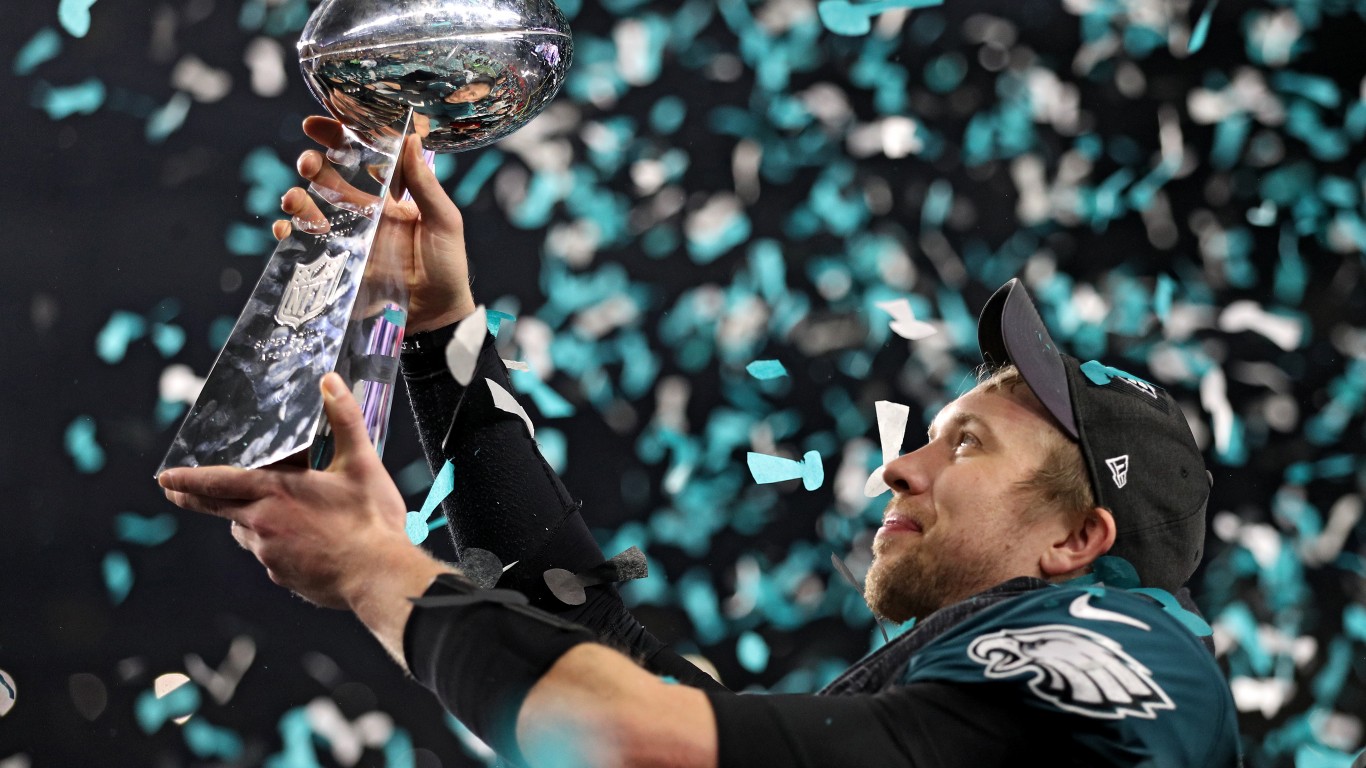
9. 2017 Philadelphia Eagles
> 2016 record: 7-9
> 2017 record: 13-3
> Super Bowl result: Won Super Bowl LII, 41-33
The 2017 Philadelphia Eagles had one of the most improbable Super Bowl wins of all time, taking down the New England Patriots with backup QB Nick Foles leading the team. The foundation was laid for this run by head coach Doug Pederson, who began the turnaround in 2016, his first season with the team.
After a so-so rookie season in 2016, QB Carson Wentz had a phenomenal sophomore season, throwing 33 touchdowns and just seven interceptions before tearing his ACL late in the year.
The Eagles were still a great team without their QB, as linemen Jason Kelce, Brandon Brooks, Lane Johnson, and Fletcher Cox all received All-Pro or Pro Bowl recognition. Foles came in for Wentz and led the team through the playoffs and netted the Eagles their first Super Bowl.
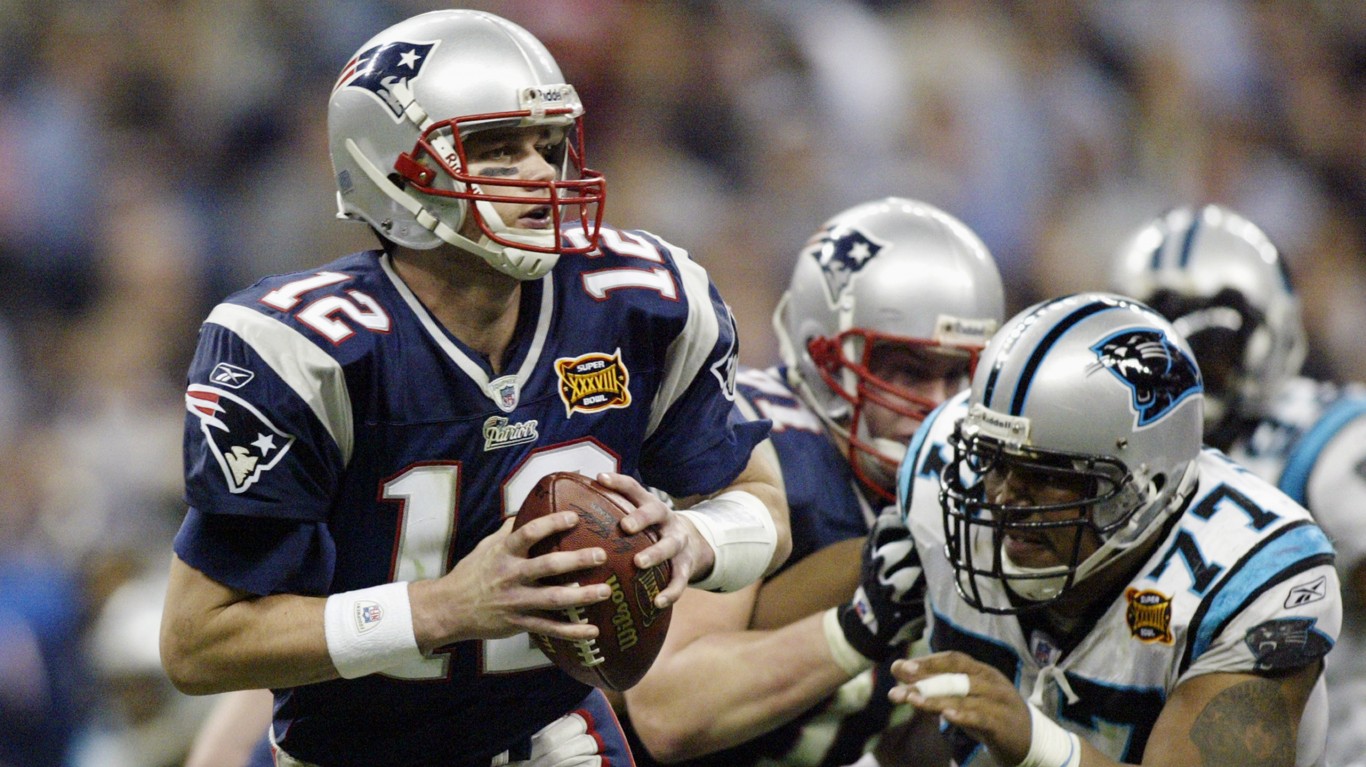
9. 2003 Carolina Panthers
> 2002 record: 7-9
> 2003 record: 11-5
> Super Bowl result: Lost Super Bowl XXXVIII, 32-29
Like many other teams that went from below .500 to making the Super Bowl, the 2003 Carolina Panthers had a second-year coach who was able to implement his system to terrific results. After going 1-15 in 2001, the Panthers wanted a change and hired John Fox as head coach. In his first season in 2002, the defense was solid, but the team struggled on offense and went 7-9.
In 2003, the team found their spark on offense by making Jake Delhomme the starting quarterback. Carolina went from one of the NFL’s worst offenses to middle of the pack. Combined with their defense, it was enough to earn an 11-5 record. The Panthers defense carried the team to the Super Bowl but came up just short against the New England Patriots, losing 32-29.
[in-text-ad-2]
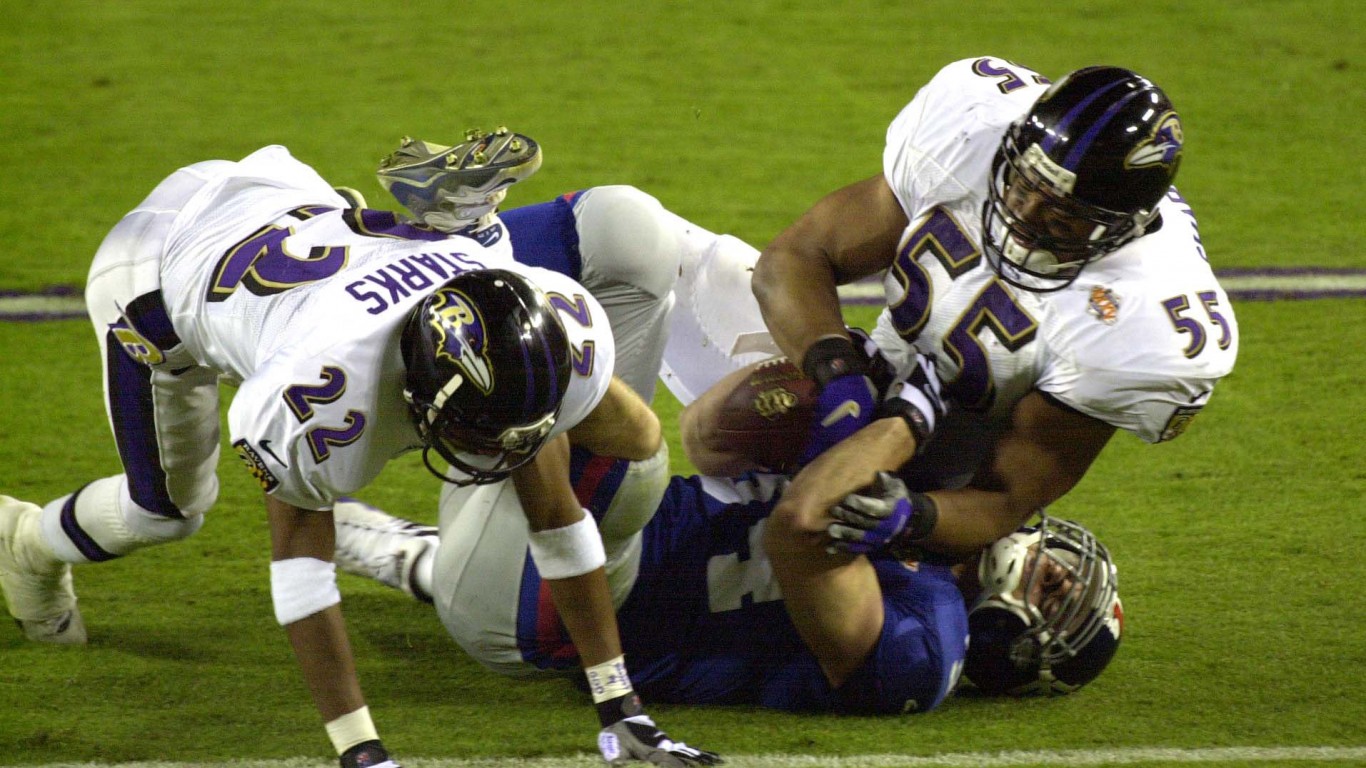
9. 2000 New York Giants
> 1999 record: 7-9
> 2000 record: 12-4
> Super Bowl result: Lost Super Bowl XXXV, 34-7
The 2000 New York Giants went from 7-9 to 12-4, largely thanks to QB Kerry Collins taking over the starting spot. He was installed as the starter midway through the 1999 season, replacing a struggling Kent Graham. The offense also received a boost when Tiki Barber took over as starting running back and posted a 1,000-yard season.
The defense also became a formidable unit, holding opponents to under 16 points per game and excelling at forcing turnovers. The Giants were dominant in their first two playoff games but couldn’t handle the Baltimore Ravens defense, losing in the Super Bowl 34-7.
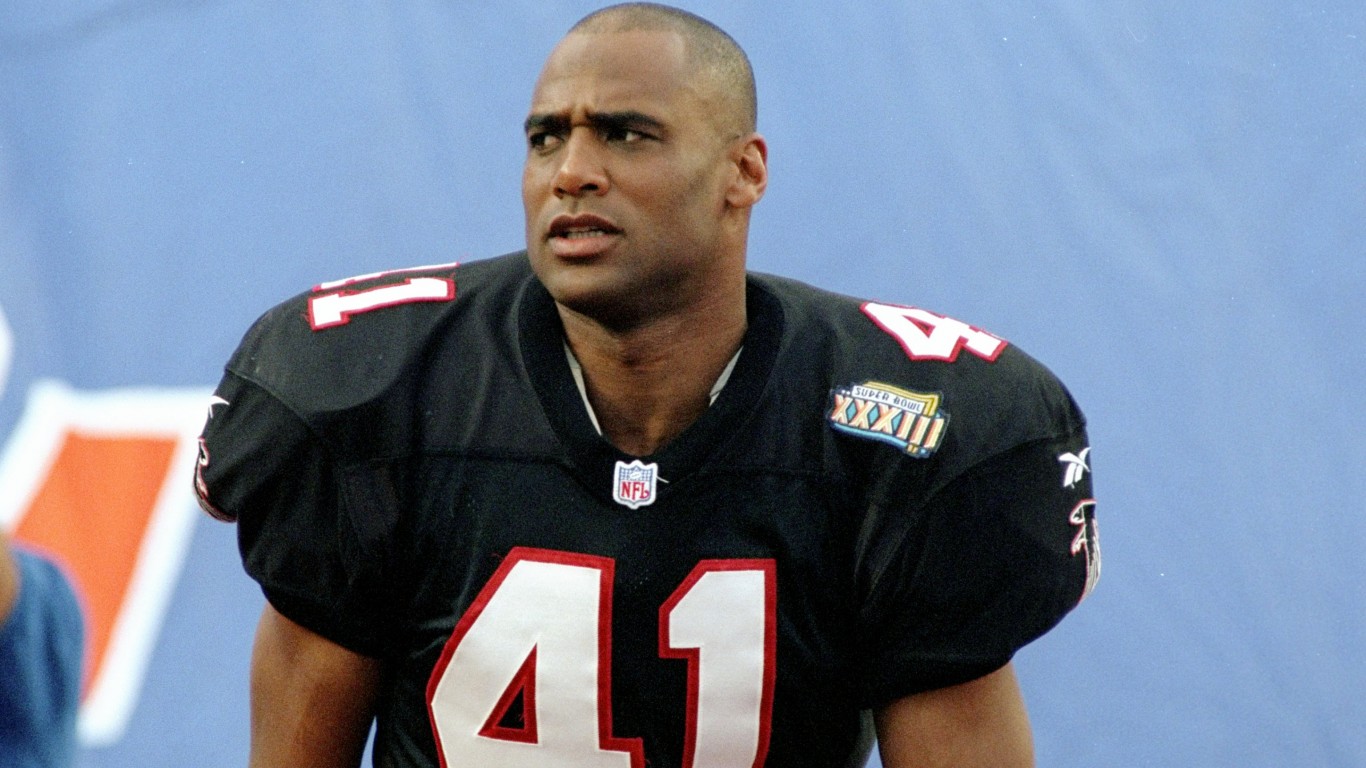
9. 1998 Atlanta Falcons
> 1997 record: 7-9
> 1998 record: 14-2
> Super Bowl result: Lost Super Bowl XXXIII, 34-19
The 1998 Atlanta Falcons had one of the most impressive statistical turnarounds of any team in NFL history. In 1997, the team had among the worst offensive and defensive units in the NFL. Just a year later, they were both among the best.
Head coach Dan Reeves started the turnaround his first year of 1997, installing journeyman QB Chris Chandler as the starter. Chandler played well, earning his first Pro Bowl nod in 1997 and again in 1998. The biggest improvement came from running back Jamal Anderson, who was named All-Pro after rushing for over 1,800 yards. The 14-2 Falcons won two close playoff games to advance to the Super Bowl but couldn’t hang with the Denver Broncos, who won their second championship in a row.
[in-text-ad]
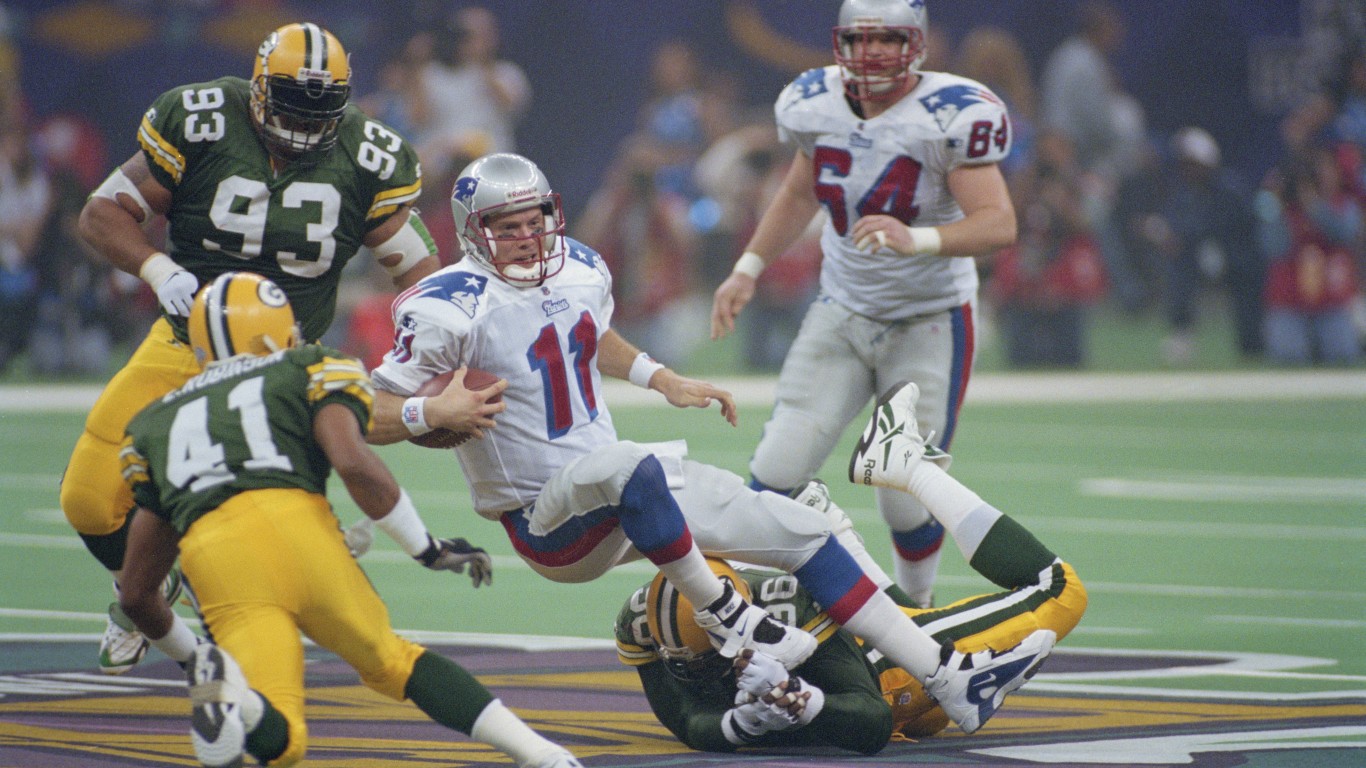
6. 1996 New England Patriots
> 1995 record: 6-10
> 1996 record: 11-5
> Super Bowl result: Lost Super Bowl XXXI, 35-21
The New England Patriots went 10-6 and made the playoffs with second-year QB Drew Bledsoe in 1994. The team was improving under legendary coach Bill Parcells but suffered a setback in 1995. Bledsoe struggled, completing just 50.8% of his passes and throwing 13 touchdowns and 16 interceptions.
The next season, Bledsoe righted the ship, returning to Pro Bowl form, throwing for over 4,000 yards and 27 touchdowns. Combined with a greatly improved defense, the Patriots went 11-5 and advanced all the way to the Super Bowl, where they lost to the Green Bay Packers.
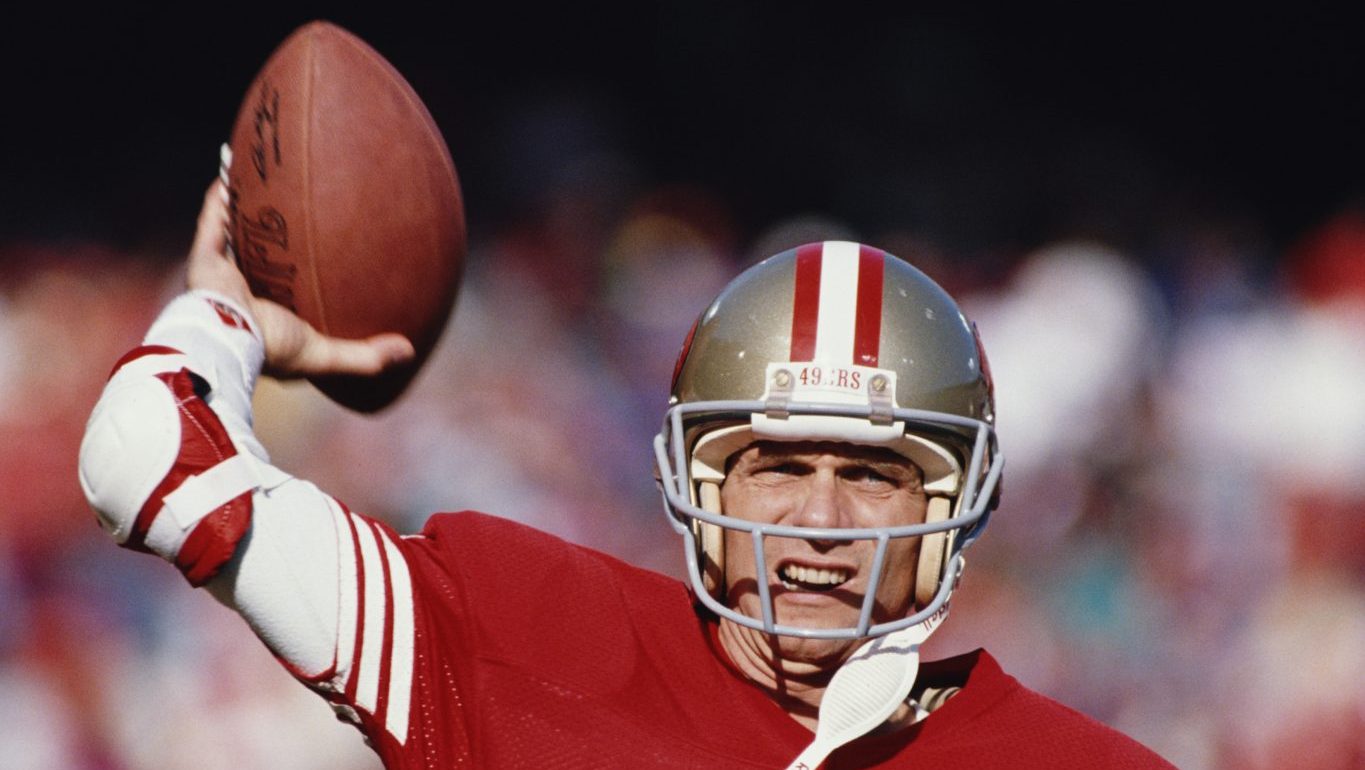
6. 1981 San Francisco 49ers
> 1980 record: 6-10
> 1981 record: 13-3
> Super Bowl result: Won Super Bowl XVI, 26-21
Before 1981, the San Francisco 49ers were an afterthought of an NFL franchise, with just a handful of playoff appearances. The team was transformed into a dynasty by head coach Bill Walsh, who took the team from 2-14 his first season in 1979 to 6-10 in 1980. The final piece to the puzzle was a great quarterback.
Future Hall of Famer Joe Montana was a backup for his first two seasons, but he earned a Pro Bowl nod and propelled the team to a 13-3 record in 1981, his first season as a full-time starter. Montana was the perfect QB for Walsh’s West Coast Offense, and the 49ers had one of the NFL’s top offenses. The defense also improved significantly as well, as rookie defensive back Ronnie Lott was an immediate star. The 49ers were suddenly the class of the NFL, winning the Super Bowl 26-21 over the Cincinnati Bengals. It would be their first of four titles in the 1980s.
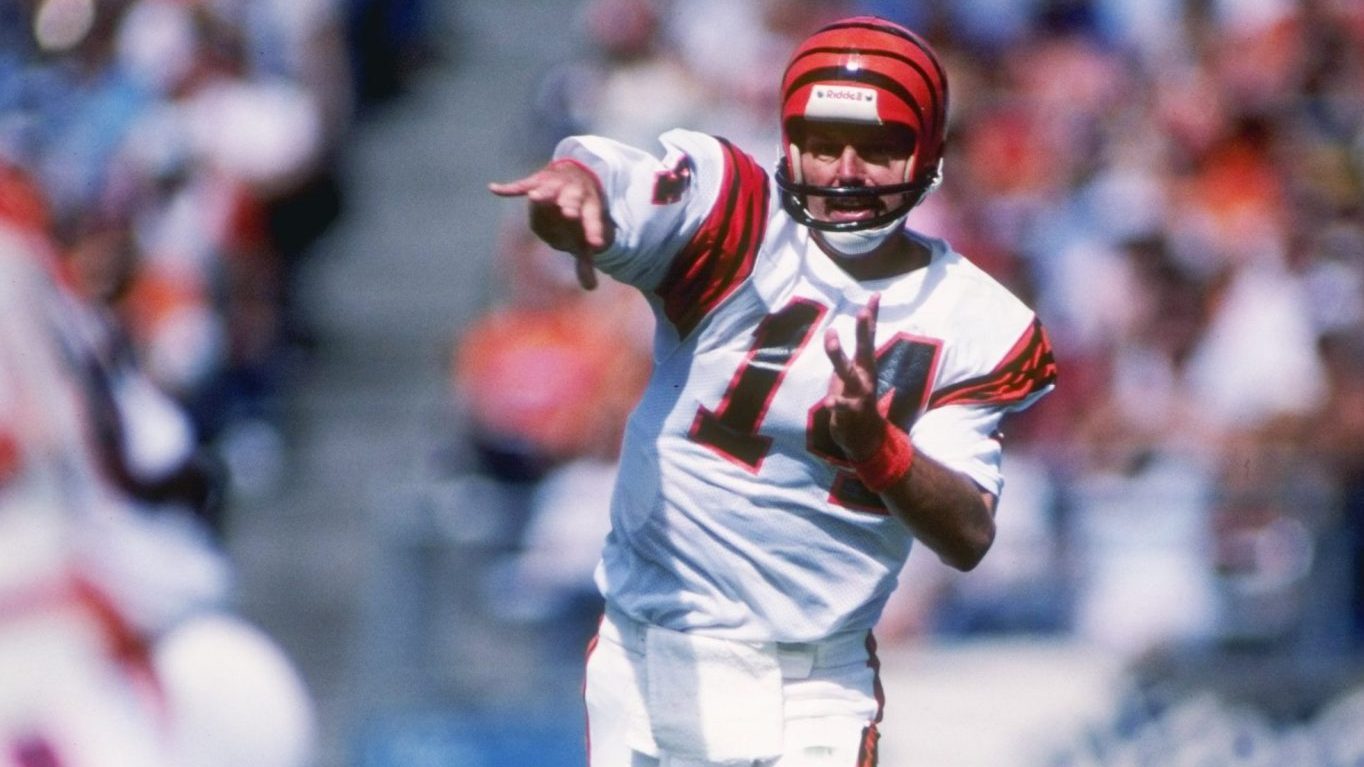
6. 1981 Cincinnati Bengals
> 1980 record: 6-10
> 1981 record: 12-4
> Super Bowl result: Lost Super Bowl XVI, 26-21
The Cincinnati Bengals have been to three Super Bowls – each coming a season after having a losing record. From 1980 to 1981, the Bengals went from having the second worst scoring offense to the third best after the team hired offensive coordinator Lindy Infante. This high-powered offense helped turn around the 6-10 team to a 12-4 Super Bowl contender.
In 1980, QB Ken Anderson threw for under 1,800 yards with six touchdowns and 13 interceptions. The next season, he had 3,754 yards passing, with 29 touchdowns and just 10 picks, earning MVP honors. Rookie wide receiver Cris Collinsworth made the Pro Bowl after posting over 1,000 receiving yards and eight touchdowns. Unfortunately for these Bengals, they ran into the beginning of the San Francisco 49ers dynasty, losing 26-21 in Super Bowl XVI.
[in-text-ad-2]
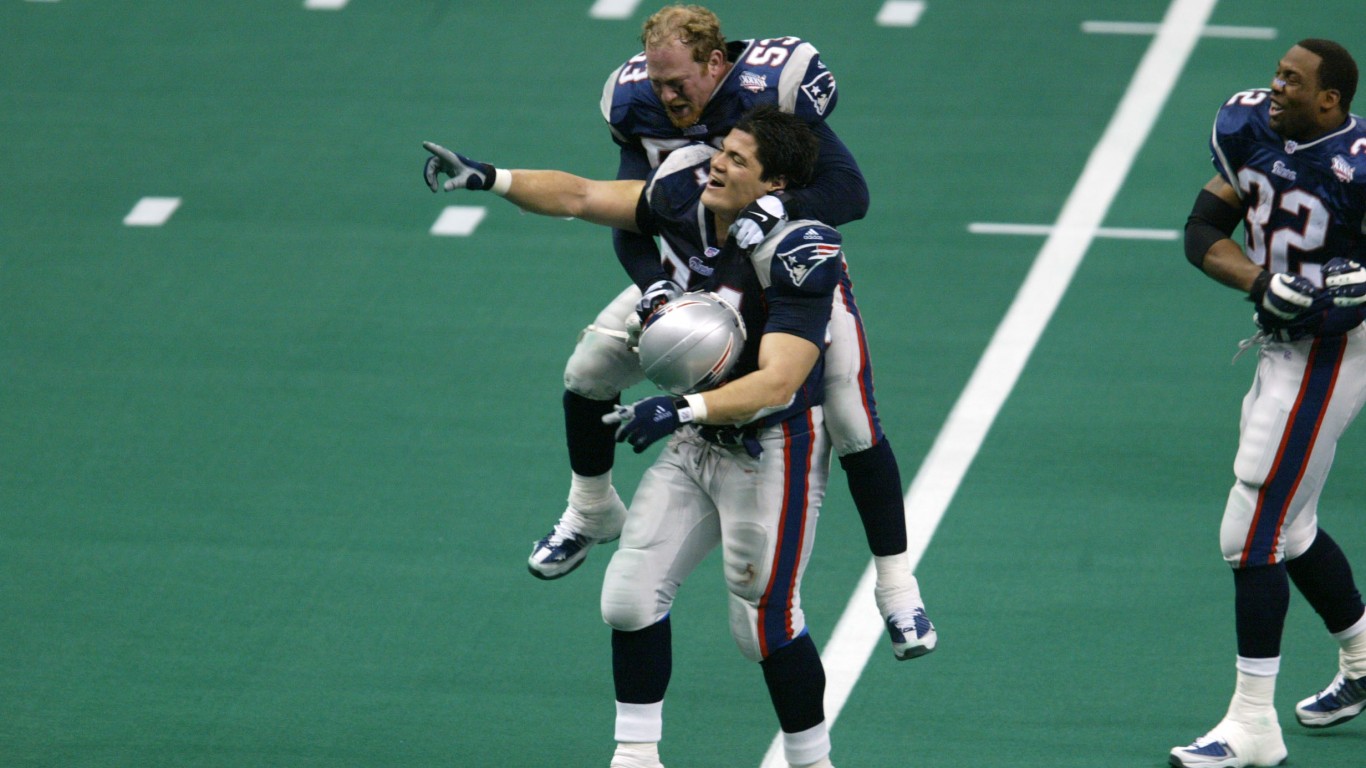
5. 2001 New England Patriots
> 2000 record: 5-11
> 2001 record: 11-5
> Super Bowl result: Won Super Bowl XXXVI, 20-17
The New England Patriots struggled in 2000 under first year head coach Bill Belichick, going 5-11. Pats fans must have been concerned the second season would go as poorly as the first – the team started 0-2 and starting QB Drew Bledsoe was seriously injured in the second game of the season. Little did they know that the greatest quarterback of all time was sitting on the bench.
Tom Brady took over as the Pats starter, and the rest was history. Brady went 11-3 as a starter that season. Along with a ball-hawking defense, Brady helped New England eke out playoff wins over the Oakland Raiders and Pittsburgh Steelers, before finally winning the Super Bowl on a last second field goal over the St. Louis Rams.
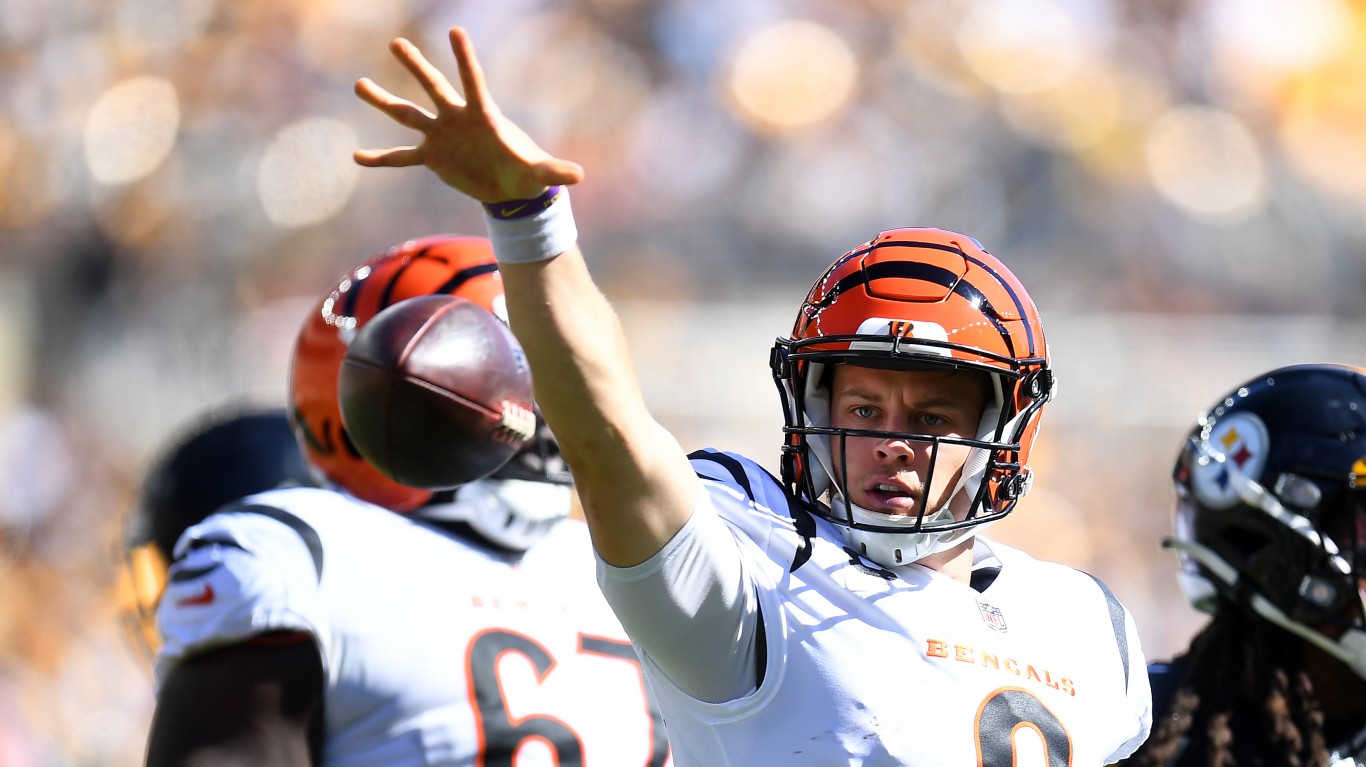
4. 2021 Cincinnati Bengals
> 2020 record: 4-11-1
> 2021 record: 10-7
> Super Bowl result: TBD
The Cincinnati Bengals have enjoyed a meteoric rise in the last two seasons due in large part to QB Joe Burrow. Cincinnati was the worst team in football in 2019, finishing 2-14. The team drafted Burrow first overall and showed signs of improvement before a knee injury ended his rookie season early.
Ahead of 2021, the Bengals drafted Burrow’s college teammate, wide receiver Ja’Marr Chase, and signed defensive linemen Larry Ogunjobi and Trey Hendrickson. All three were terrific moves, as the Bengals porous defense improved, and their offense became one of the best in the NFL. The young team upset the top-seeded Tennessee Titans and the reigning AFC champion Kansas City Chiefs en route to Cincinnati’s first Super Bowl in over 30 years.
[in-text-ad]
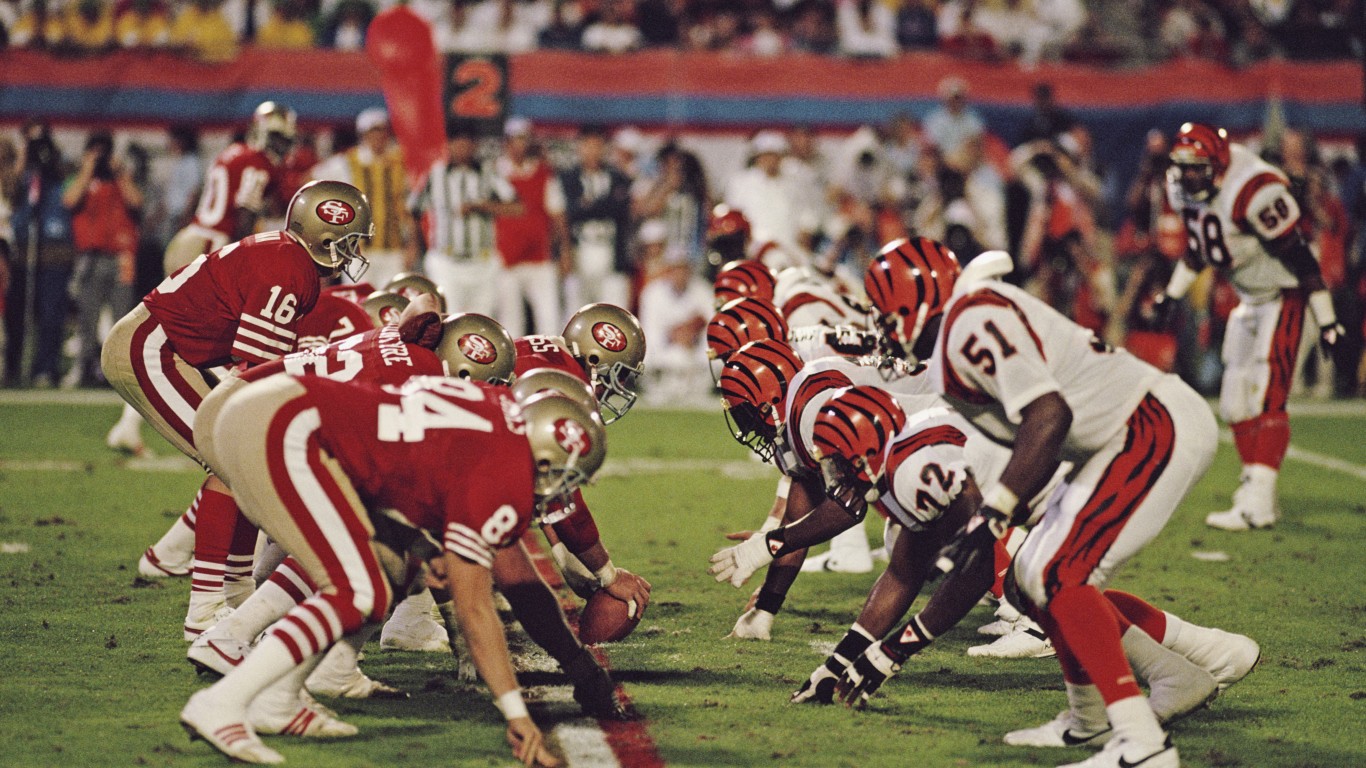
3. 1988 Cincinnati Bengals
> 1987 record: 4-11
> 1988 record: 12-4
> Super Bowl result: Lost Super Bowl XXIII, 20-16
The Cincinnati Bengals had been a solid squad ahead of the 1987 season, but when QB Boomer Esiason struggled, the team struggled as well. He tossed 19 interceptions and just 16 touchdowns, as the Bengals went 4-11.
The next season, Esiason played his best season, throwing 28 touchdowns and 14 picks and earning NFL MVP honors. The team had a potent rushing attack, as rookie fullback Ickey Woods and running back James Brooks combined for nearly 2,000 yards on the ground, and the Bengals had the NFL’s top offense both in terms of yards and points. Cincinnati came up just short in the Super Bowl, losing 20-16 to the San Francisco 49ers.
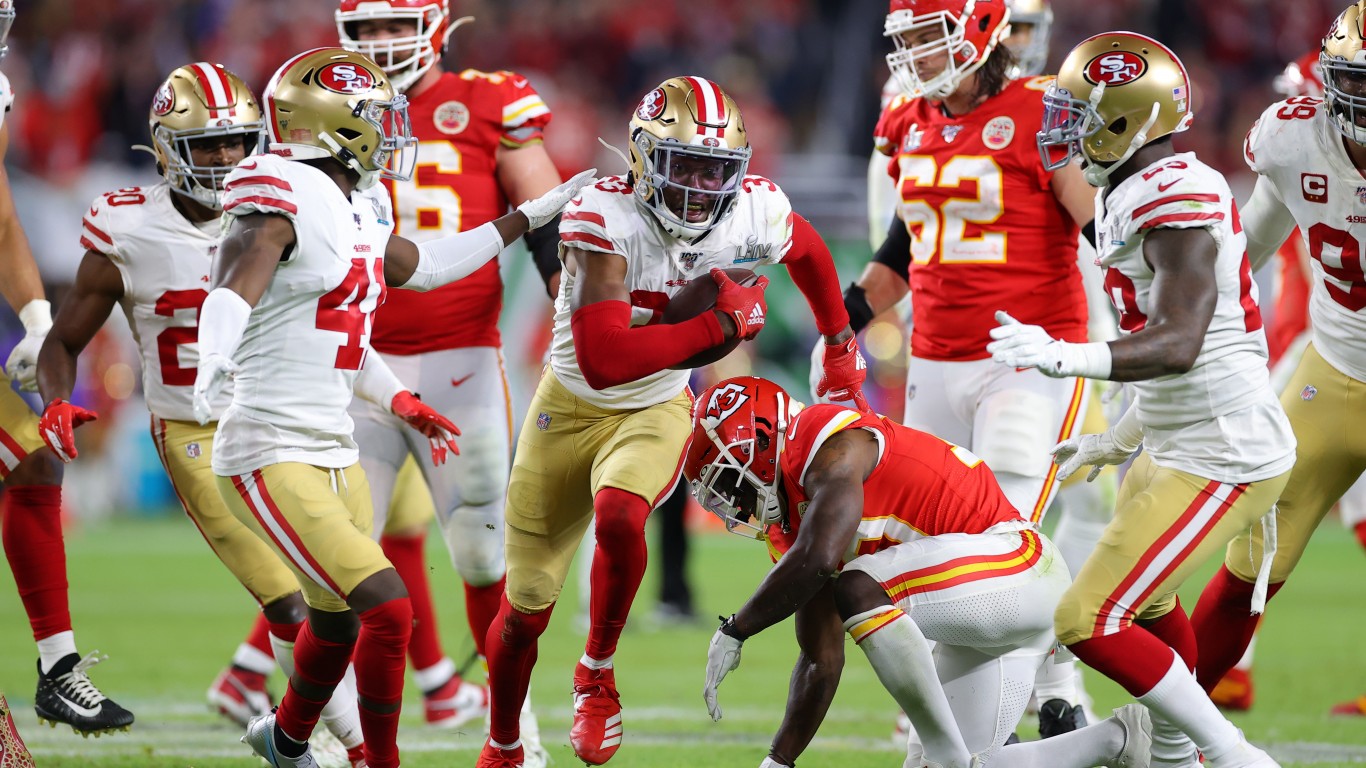
1. 2019 San Francisco 49ers
> 2018 record: 4-12
> 2019 record: 13-3
> Super Bowl result: Lost Super Bowl LIV, 31-20
The 2019 San Francisco 49ers are one of just two NFL teams that went to the Super Bowl a season after winning just 25% of their games the season before. San Francisco’s offense struggled in 2018 after QB Jimmy Garoppolo tore his ACL, and the defense was also one of the worst in the league.
The offense benefitted from Garoppolo’s return the next season, as well as the addition of dynamic rookie receiver Deebo Samuel. The 49ers defense went from abysmal to dominant, thanks to Pro Bowl seasons from cornerback Richard Sherman and rookie defensive end Nick Bosa. The 49ers looked to be well on their way to a title, but gave up 21 fourth quarter points to the Kansas City Chiefs, losing Super Bowl LIV 31-20.
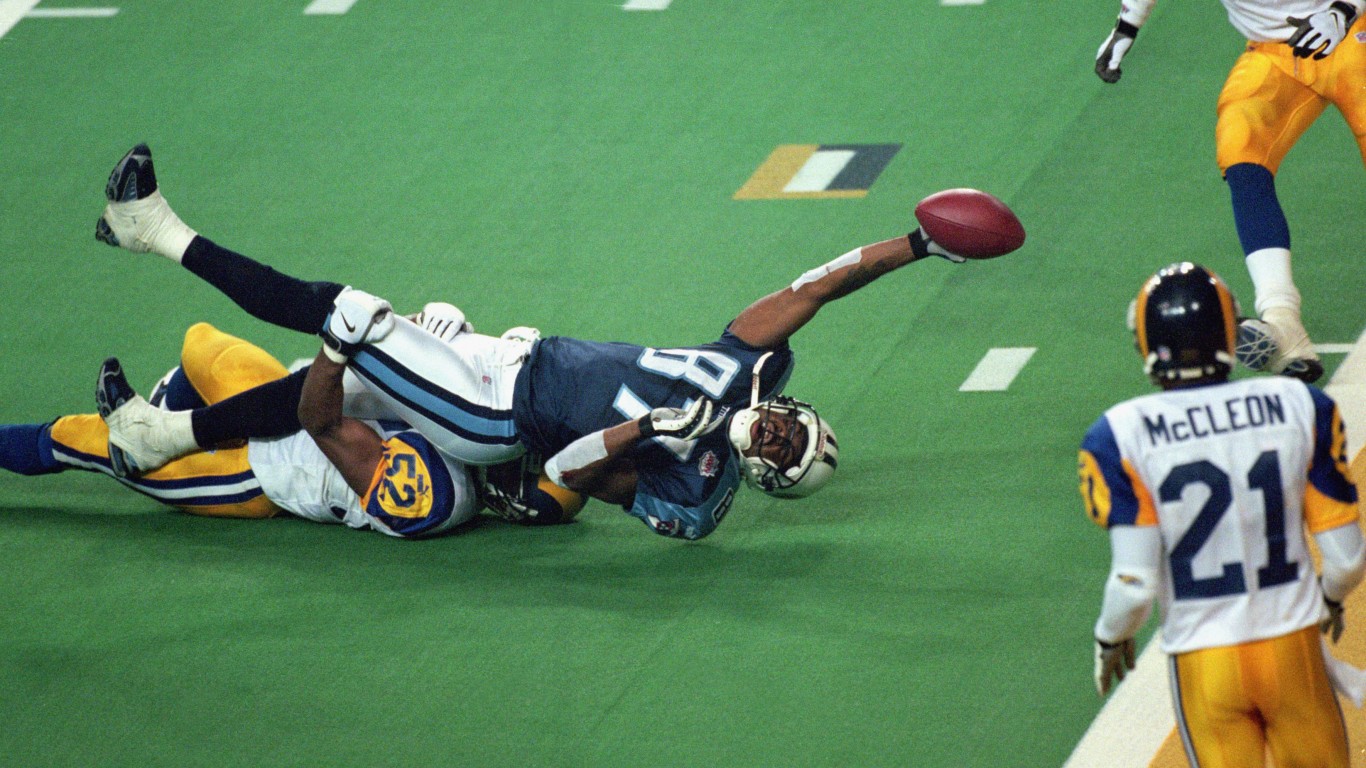
1. 1999 St. Louis Rams
> 1998 record: 4-12
> 1999 record: 13-3
> Super Bowl result: Won Super Bowl XXXIV, 23-16
No team has ever completed as impressive a turnaround as the 1999 St. Louis Rams. The team went from a 4-12 last place team to Super Bowl champions. The 1998 Rams struggled with Tony Banks at QB, so they brought in Trent Green for the 1999 season. When he suffered a season-ending knee injury, St. Louis turned to a little-known replacement named Kurt Warner.
After playing in semi-pro football early in his career, Warner went on to win MVP in 1999, his first full NFL season, at age 28. Warner was helped by star wide receivers like Isaac Bruce and Torry Holt, as well as the offseason addition of Hall of Fame running back Marshall Faulk. The Rams offense came to be known as the “Greatest Show on Turf,” as they led the league in yards and points. The offense powered the Rams to a 23-16 Super Bowl win over the Tennessee Titans.
Credit card companies are at war, handing out free rewards and benefits to win the best customers. A good cash back card can be worth thousands of dollars a year in free money, not to mention other perks like travel, insurance, and access to fancy lounges. See our top picks for the best credit cards today. You won’t want to miss some of these offers.
Flywheel Publishing has partnered with CardRatings for our coverage of credit card products. Flywheel Publishing and CardRatings may receive a commission from card issuers.
Thank you for reading! Have some feedback for us?
Contact the 24/7 Wall St. editorial team.